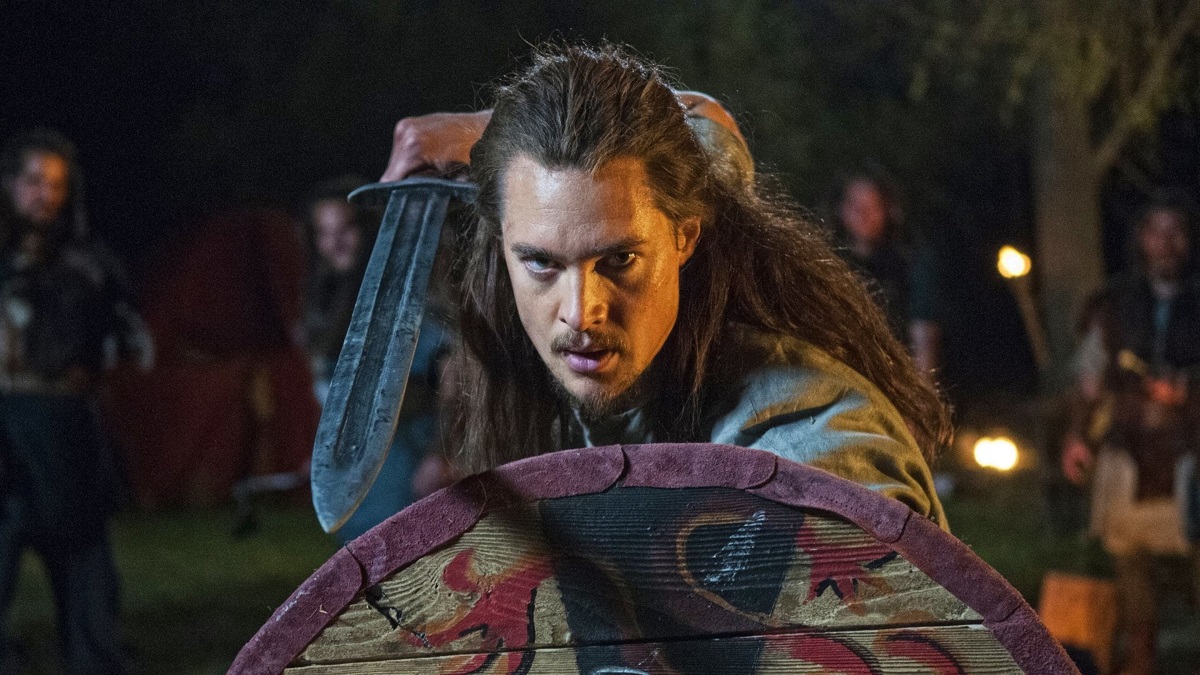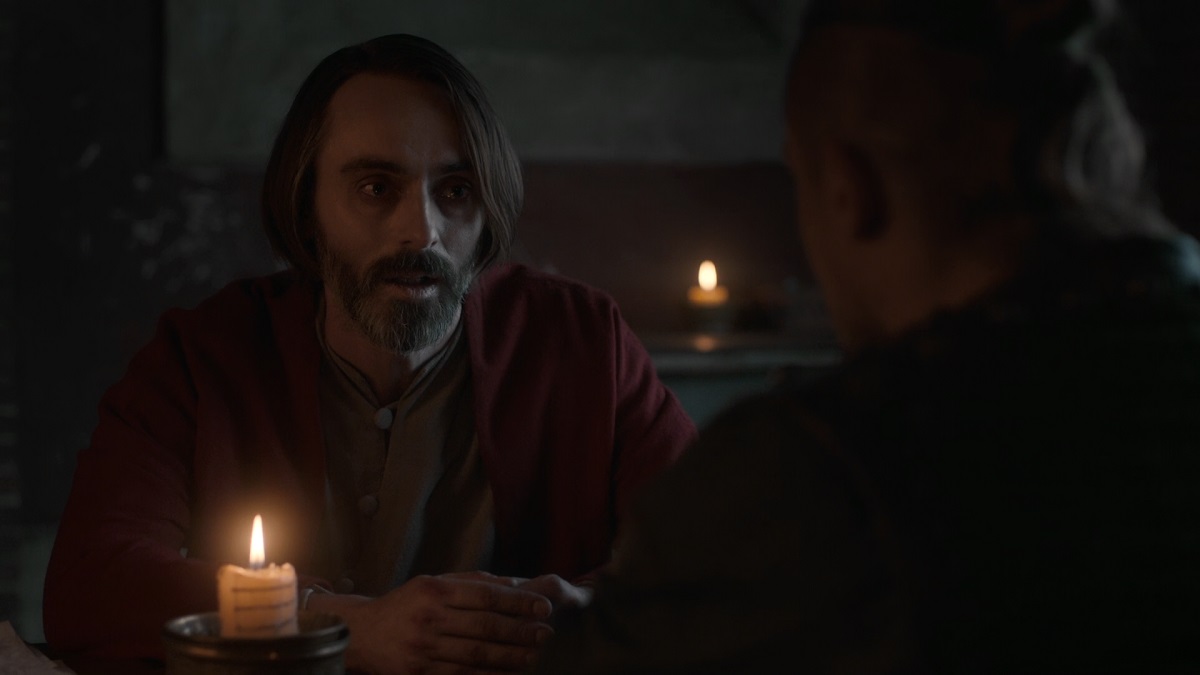Since The Last Kingdom premiered in 2015 we have followed the journey of Uhtred from an untested warrior to the greatest kingmaker England has ever known, but how much of the character and his story is actually rooted in the real history of the struggles between the Saxons and the Vikings?
The Last Kingdom is adapted from the works of British author Bernard Cornwell, who first conceived this narrative in the early 2000s after passionately studying, for many years, the history of the Anglo-Saxons and the making of England at the hands of Alfred the Great and his descendants.
Thus, the story of Uhtred, son of Uhtred, came into existence. Born a Christian and raised a Dane, Uhtred — as the ultimate swashbuckling hero — plays a key part in the events that lead to the coronation of Alfred and the expanse of his influence, constantly running from this castle or that borough in rescue of princesses or athelings who would inherit the crown of Wessex.
Lord Uhtred continues to serve at the pleasure of Saxon kings for many years throughout the course of the novel series and the live-action adaptation, taking part in real historical events like the Battle of Edington or the Siege of Bebbanburg, helping Alfred and his kin lay the foundations of a united kingdom, the dream of an emergent England.
In this long and arduous journey in search of his destiny, Uhtred is also acquainted with many real historical figures besides Alfred, like the rebellious Aethelwold, Aethelred of Mercia, Aethelflaed of Wessex, and even the king’s successors, Edward and Aethelstan.
Yet the question remains; did Uhtred himself actually exist in the 9th century?

Well, the answer to that question is a little tricky. Cornwell has revealed that Uhtred is indeed inspired by a real ealdorman of Northumbria, a warrior known as Uchtred the Bold, who served as the overlord of Bebbanburg in the late 10th century, almost a hundred years after the story of the fictional Uhtred takes place. But that’s pretty much where the similarities with the story character end.
In essence, Cornwell has used the premise of Uchtred the Bold’s life as a foundation for his fictional protagonist. It also goes without saying that most of Uhtred’s heroics didn’t actually happen in real life and were made up by the author, but the narrative roughly follows in the footsteps of historical developments.
For instance, Alfred did hide in the Somerset marshes when Wessex was overrun by an army of Danes. And he did defeat them later in the Battle of Ethandun, resulting in a treaty with Guthrum of East Anglia, but there was no Uhtred of Bebbanburg to single-handedly break the Danish shield wall and turn the tide of the battle.
One of the reasons Cornwell chose Bebbanburg as a cornerstone for his story finds its root in the amusing fact that he found out he’s a descendant of Uchtred the Bold. In a 2020 interview with The Guardian, the best-selling novelist detailed how meeting his real father in Canada, whose surname was Oughtred, inspired him to begin penning this story.
“I saw this name Uhtred. He said they lived at Bamburgh castle. Once I realized I was descended from this man who was the Lord of Bebbanburg, that was it. I had to write a book about the creation of England. Most historical novels have a big story and a little story, and the big story is the true story. I didn’t see a way into that little story until I met my real father.”

The relationship between the cunning King Alfred and the prideful Uhtred of Bebbanburg is the ultimate character dynamic of The Last Kingdom, one that highlights what Cornwell set out to do with the story in the first place. This story is not just the tale of a single hero that takes form through Uhtred, but the record of a people whose struggles and hardships eventually paved the way for the emergence of England.
But unlike most narratives that vilify one side over the other, Cornwell doesn’t necessarily paint the invading Danes as the enemy, nor does he depict the Saxons in the light of the piety they cling to through Christianity. If anything, the contrast that the story’s vast ensemble of grey characters draw together shows us that true morality often starts in one’s character, and not the tenets of their faith or culture.
Born as a Saxon and raised as a Dane, Uhtred is the key that unites the two peoples in this fictional history, though the character admittedly has a tendency to find himself on the side of the Saxons, perhaps due to the fact that the real Uchtred was a Saxon lord of Bamburgh.
There aren’t a lot of historical records about the life of Uchtred the Bold, only that he appeared in numerous skirmishes when the Scots invaded Northumbria in 1006. When neither King Aethelred II nor Aelfhelm, earl of Eoferwic, took action, Uhtred led a band of warriors against the invaders and decisively defeated them, creating a strong foothold for his house and inheriting the fortress of Bebbanburg.

That definitely sounds like something our Uhtred from The Last Kingdom would do, but as far as heroics are concerned, the fictional character humbles the real historical figure. Such is often the shortcoming of reality though, amended through the power of dramatization by storytellers like Bernard Cornwell.
The lack of records detailing the life of Uchtred is something that frustrated the writer too, but now, more than 18 years since the first Saxon Stories book came out, it’s fair to say that that he didn’t need the guidance of history books to come up with a compelling narrative for his warrior kingmaker.
The story of Uhtred is that of a man searching for his true purpose in a world of turmoil. The story of The Last Kingdom is a page out of history books, one that informs the formation of England and the clash of faiths between Saxons and Danes. It’s a story of how warriors are forged in the fire of sacrifice, and how greed can lead to chaos and destruction. Also how prejudice can be a people’s undoing, and how politics and intrigue will always end up making things worse for the commoners.
In summary, business as usual for mankind. So, when you think about it in those terms, the story of Uhtred of Bebbanburg is the perfect historical allegory, even if the hero himself is largely, albeit not entirely, fictitious.

